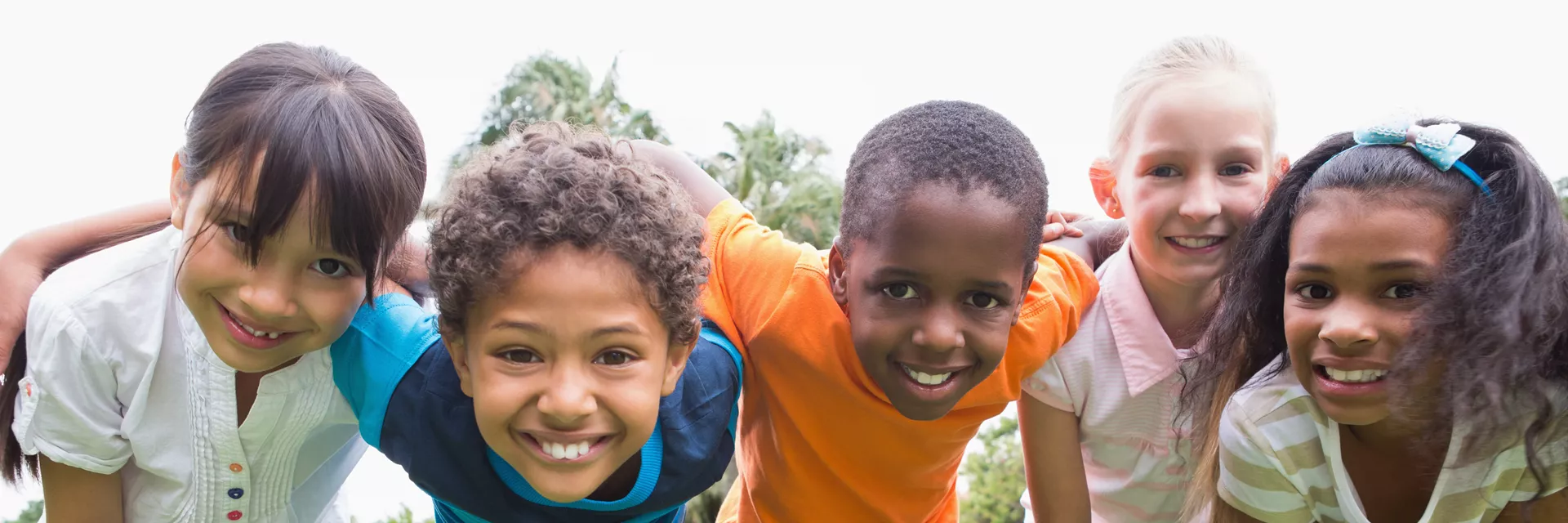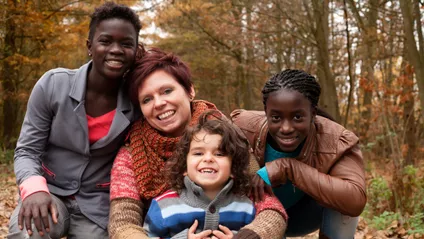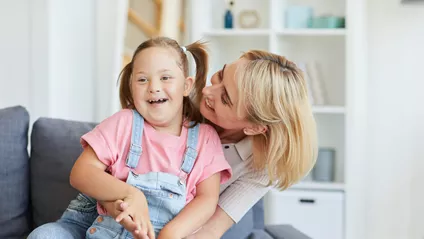
Caring for a child from a different ethnicity, race or religion
JUMP TO:
Foster parents may welcome children of different ethnicities, races, religions and cultures into their homes, so it’s important to learn about the child’s background to be able to meet not just their physical needs but their emotional needs too.
In this article, we delve into the importance of identity formation and just some of the ways you can help a child from a different background thrive in your care. But before we do that, let’s explore the differences between culture, ethnicity and race.
What's the difference between ethnicity and race?
What is the difference between ethnicity and race?
Race (or racial identity) is described as “a category of humankind that shares certain distinctive physical traits” and is associated with physical characteristics, such as skin colour, hair texture, facial structure and more. Some examples of race include White or Caucasion, Black, Asian and Latino. People may also come from a mixed race background, where their parents or ancestors have different racial identities.
Ethnicity on the other hand, is a much broader term that looks beyond the physical attributes of a person, taking into account the wider culture of a group of people too. It is described as “large groups of people classed according to common racial, national, tribal, religious, linguistic, or cultural origin or background.” So a person’s race might be ‘Black’, but their ethnicity may be Nigerian, Ghanaian or Jamaican, for example. Similar to race, many people come from dual heritage backgrounds and may identify with multiple ethnicities.
What's the difference between culture and ethnicity?
What is the difference between culture and ethnicity?
Ethnicity and culture are two terms that are often used interchangeably. However, despite their similarities, there is a distinct difference.
Culture is a representation of the behavioural characteristics of a particular society, which are passed down from generation to generation. It covers a wide range of things including language, religion, beliefs, traditions, cuisine, social habits, music, art, clothing, marriage, relationships, and so much more. Culture is not biologically inherited, it’s learned over time by observing the behaviour of parents or caregivers, and other people in the community.
Conversely, ethnicity is the way in which we categorise people based on their ancestry, cultural identity, language, race, motherland and more. Cultural traits, however, are often shared among people from the same ethnic background.
Care routines for children of different ethnicities
There are a number of different things that a foster parent will need to think about when caring for a child or fostering teenagers from a different race, religion or ethnic background. This will ensure that both their physical needs and emotional needs are met and that they can develop a sense of belonging and acceptance.
Meeting their physical needs
Hair
The structure and texture of a Black child’s hair are very different to that of a Caucasian child, for example. They will need a completely different haircare routine to protect their hair and avoid damage.
This routine should include less frequent washing, the use of gentle shampoos and conditioners that are designed for Black hair, protective styling, and regular deep conditioning treatments. It’s also important to find hairdressers who are experienced with their individual style of hair.
Skin
People of colour are generally more prone to having dry skin. Hydration is therefore key, and skin should be moisturised daily to prevent it from drying out and developing an ashy appearance. Black skin is also likely to be more sensitive, so it’s important to use gentle products without any harsh chemicals – cocoa butter is great!
Finally, SPF sunscreen is just as important on Black skin as it is on lighter shades – contrary to popular belief, darker skin doesn’t have a natural defence against damaging sun rays.
Useful resources:
Meeting their cultural needs
Foster care and religion
Some children and teenagers in foster care may wish to continue practicing their faith. Others may not want to engage in their religion at all.
As a foster parent, it’s important that you understand where your young person is at in terms of their faith and how much input they want from you, so you can best support them

For those children who wish to continue practising, here are a few simple ways you can support them:
- Find out if they’d like to go to their place of worship (e.g. church, mosque, temple, synagogue, etc), how often they wish to visit, and where their local faith group is based.
- Make space for their religion in your home. Whether that’s by creating a quiet and comfortable space for the child to pray, or through open and meaningful chats about their faith.
- Provide culturally appropriate food for them. For example, find out whether there’s any food that’s prohibited in their religion, find your local kosher or halal butcher if needed, and discover some traditional recipes online.
- Celebrate religious festivals as a family with your young person. You could also reach out to local members of your child’s religious community to learn how they celebrate, so you can try to celebrate in an authentic way.
- Accommodate your child’s faith-based clothing (such as a turban, hijab, burqa, or sari) in your home by speaking to them about what they would like to wear. You could also find a local clothing shop specifically for people of their faith or culture and go shopping together.
- Stay curious about their religion and continue learning through reading books, watching films and documentaries, listening to podcasts, and engaging with your child’s religious community. Encourage other children and teens in your home to learn about their religion too.
If your child doesn’t wish to practice their faith, that’s okay too. But just bear in mind that at some point they may wish to explore their religion again. Just keep the conversation open so they feel safe speaking to you about their wishes.
When it comes to fostering and religion, it’s really about you and your family being interested in your foster child’s faith, respecting their beliefs and celebrating religious festivals with them together. This will help them to feel like they belong in your family, even though their beliefs might be different.
Cultural identity formation
Alongside race and ethnicity, culture is an important part of identity formation, and it’s something we generally learn from our parents. However, when a child moves into foster care – away from their parents and sometimes people who share the same racial, ethnic and cultural traits – the child is at a major disadvantage in terms of their identity and finding the answer to “who am I?”
Therefore, it’s important to immerse your child in their culture, so they can begin to figure out who they are, what they like, what they dislike, and all the other important things that make up a person’s identity. As always, you must be led by your child and how much they want to be immersed in their culture. But just like religion, try to keep an open dialogue around culture, so they feel comfortable sharing their wishes with you.
Here are some ways you can help to incorporate your child’s culture into your family life:
- Reach out to cultural communities in your local area. This gives your child the opportunity to learn about their culture in an authentic way. There are many different cultural association groups across the UK, including the African and Caribbean Association, Eritrean Community, and so many more. Search your child’s ethnicity along with ‘community group near me’ on Google to find their local cultural group.
- Try to cook lots of different food that’s traditionally enjoyed in your child’s culture. Buy a cookbook, find recipes online, and prepare the food together, encouraging your whole family to get involved. There are also restaurants and takeaways for virtually every cuisine, as well as street food markets and food halls with a huge range of tasty and culturally diverse food.
- Music is a huge part of culture and can help form identity too. Allow your child the freedom to explore different music (age-appropriate, of course) completely without judgement, even if it’s not to your taste. Go one step further and take them to a concert or gig for one of their favourite artists.
- Increase diversity in every part of your life – from the books, magazines and toys you have in your home, to the artists you listen to and the TV shows and films you watch. Representation really does matter.
Despite your ethnic and cultural differences, there are so many ways that you can help your child feel safe to explore who they are, celebrate their differences, and feel accepted in your family just the way they are.
Experience of multi-ethnic children in care
We often hear the struggles of mixed-race children, particularly in relation to identity. Mixed race people often speak about flitting between one race to another and back again, depending on where they are, who they are with, and what they are doing. This in itself can be problematic because they may never truly know who they are, instead they simply adapt to fit in with those around them.
If you’re caring for a mixed-race child, then it’s important that you keep an open dialogue about your child’s racial background and ethnicity. Speak to them about the different parts that make up their identity – for example, talk to them about their parent’s ethnic backgrounds and what features they may have inherited from whom. In day-to-day life, you can help them experience the different parts of their heritage through food, music, dance, language, traditions, and more. By helping your child explore all the different cultures that make up their identity and making space for them all in your home, your child will be free to be who they want to be.

Children’s developmental understanding of ethnicity and race
While the age at which a child begins to notice ethnic differences is unclear, there are a number of studies that suggest the notion that ‘children do not see colour’ is simply not true. The American Academy of Paediatrics says that the development of understanding ethnicity and race in children starts from around 6 months old…
- At 6 months old, a baby’s brain can notice race-based differences.
- By ages 2 to 4, children can internalise racial bias – this is generally learned from their parents.
- By age of 12, many children will become set in their beliefs.
Another study published in Developmental Science found noticeable differences in a baby’s preference for faces from the same ethnic group at 3 months old, compared to when they were just days old.
This demonstrates the importance of diversity and representation at home, school and in the wider world, as well as parents and caregivers addressing their own racial biases too. Parents have around a 10-year window to make a real difference in a child’s understanding and acceptance of people from all different races and ethnicities, and it’s our job to celebrate the differences, challenge racial stereotypes, and ultimately decrease internalised racial bias in our children.
Of course, this can also be one of the challenges for foster parents – particularly for those children who may have been raised by parents with racist views. There will be a lot of work to do, but it’s not impossible. Be their role model, introduce them to a wide and culturally diverse social network, and continue to have open conversations with them about race, diversity and racism.
How can racism and discrimination affect children?
One of the questions many people have is “how does racism affect children?” The simple answer is that racism has a huge impact on a child’s mental health, confidence and self-concept, particularly when experienced in primary school when they are also trying to figure out who they are and how they fit into the world around them.
The work for foster parents and those within the child’s network – for example, their therapist, social worker or teacher – is to work on building their self-esteem and ego strength, so that their thoughts about themselves are not negative or based on what they’ve experienced. Knowing that they are enough and loving the skin they are in is what will take them through life.
About ISP Fostering
As the leading provider of therapeutic fostering, we’ve placed children at the centre of our thinking for over 35 years. The children and teenagers in our care come from all different backgrounds and are matched with loving foster families who provide them with enriching childhoods.
This series, ‘Race, Ethnicity & Identity In Foster Care’, is packed full of advice and support from a whole range of professionals that foster parents can tap into. This includes Karen Simpson (MBACP (Accred), one of our qualified therapists who’s worked with a variety of young people who may be experiencing issues with identity, low self-esteem, anxiety, depression, and more.

Join our team
Looking to join a foster agency that expertly supports foster families and children from all walks of life?
We’re always on the lookout for talented foster parents who want to further their careers with new challenges, a strong support network and excellent training and development opportunities.
If you’re new to fostering or thinking about transferring, then call us on 0800 0857 989 or click ‘enquire now’ below and complete our online form.
Keep Reading…

Importance Of Diversity In Foster Care
Karen Simpson discusses the importance of diversity and representation for all children within foster care and how to introduce ethnic and cultural differences to children.

What Is Identity Formation?
Karen Simpson, explains the role of race, ethnicity and culture in identity formation, and how being in foster care may impact that.

Fostering a Child With Complex Needs
This collection is aimed at foster parents to support you when caring for children with complex needs.